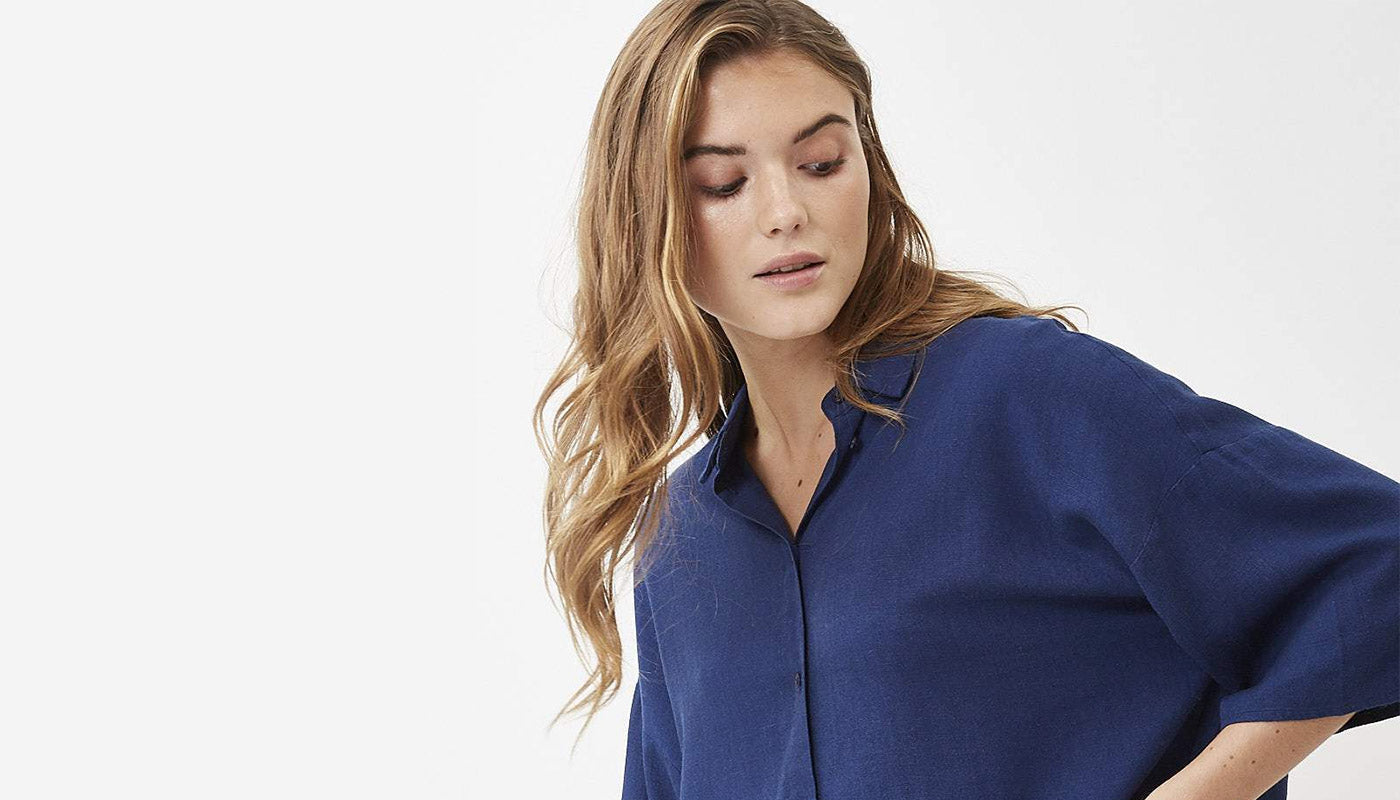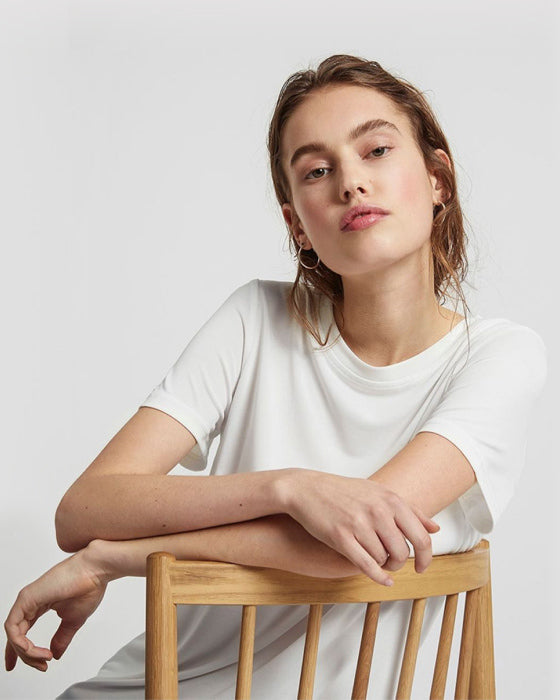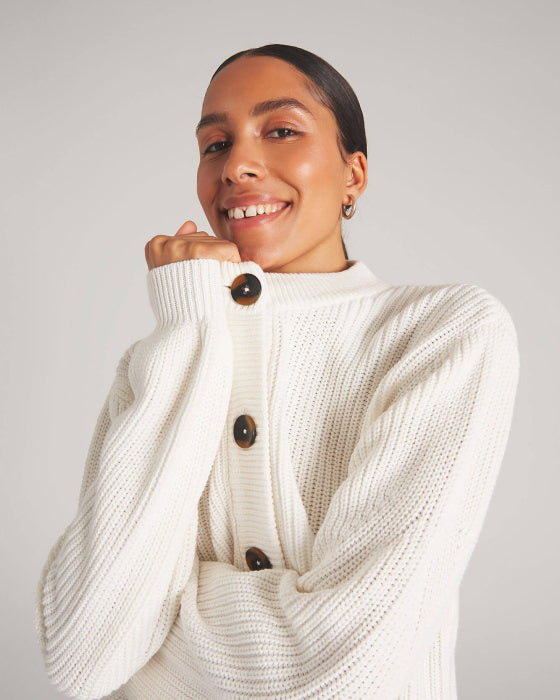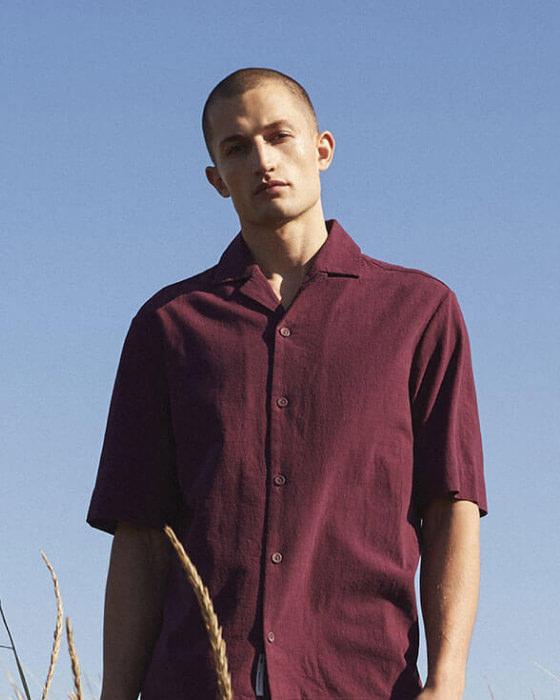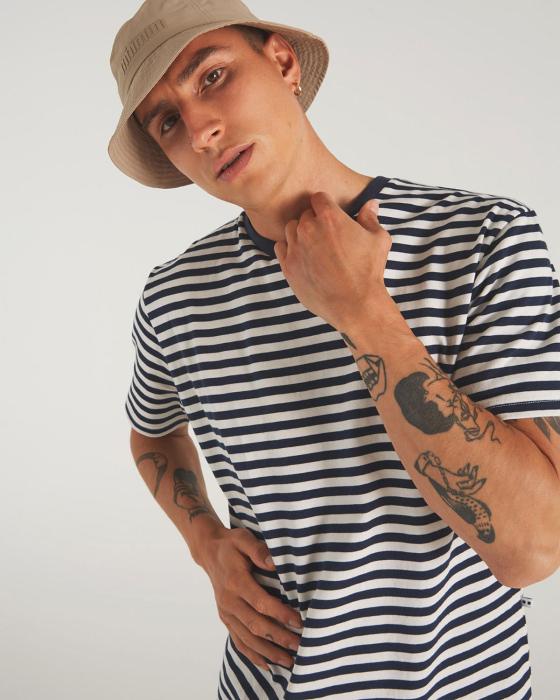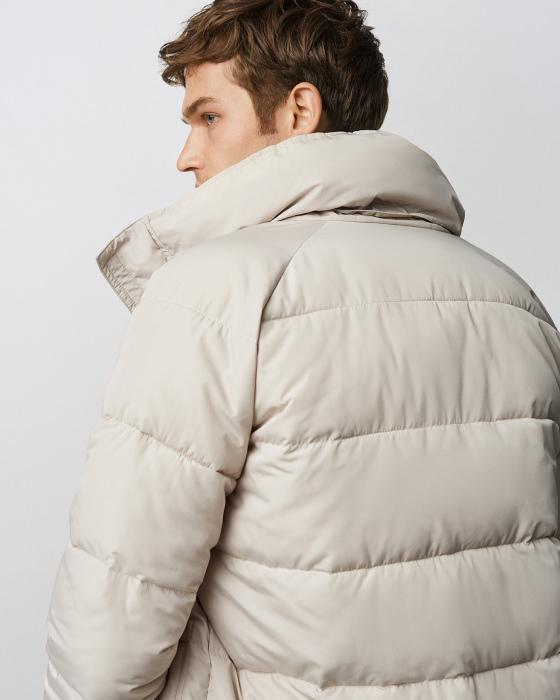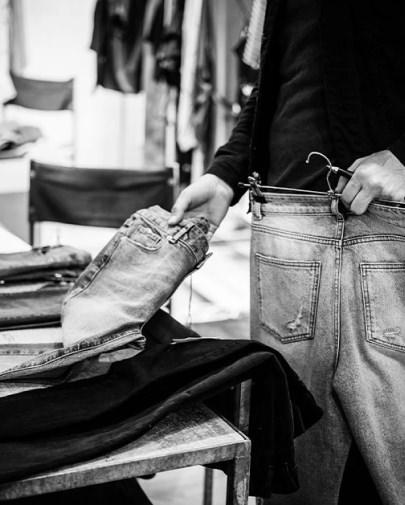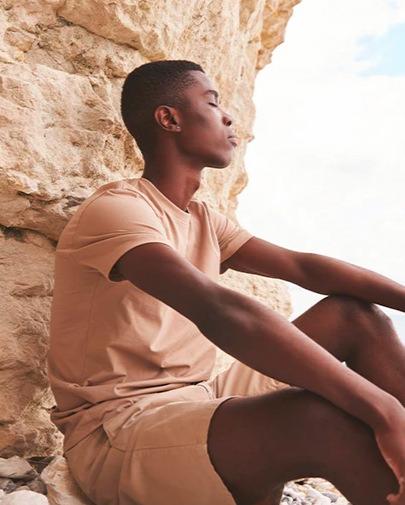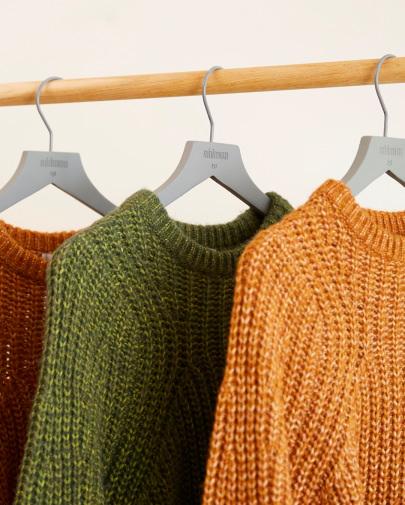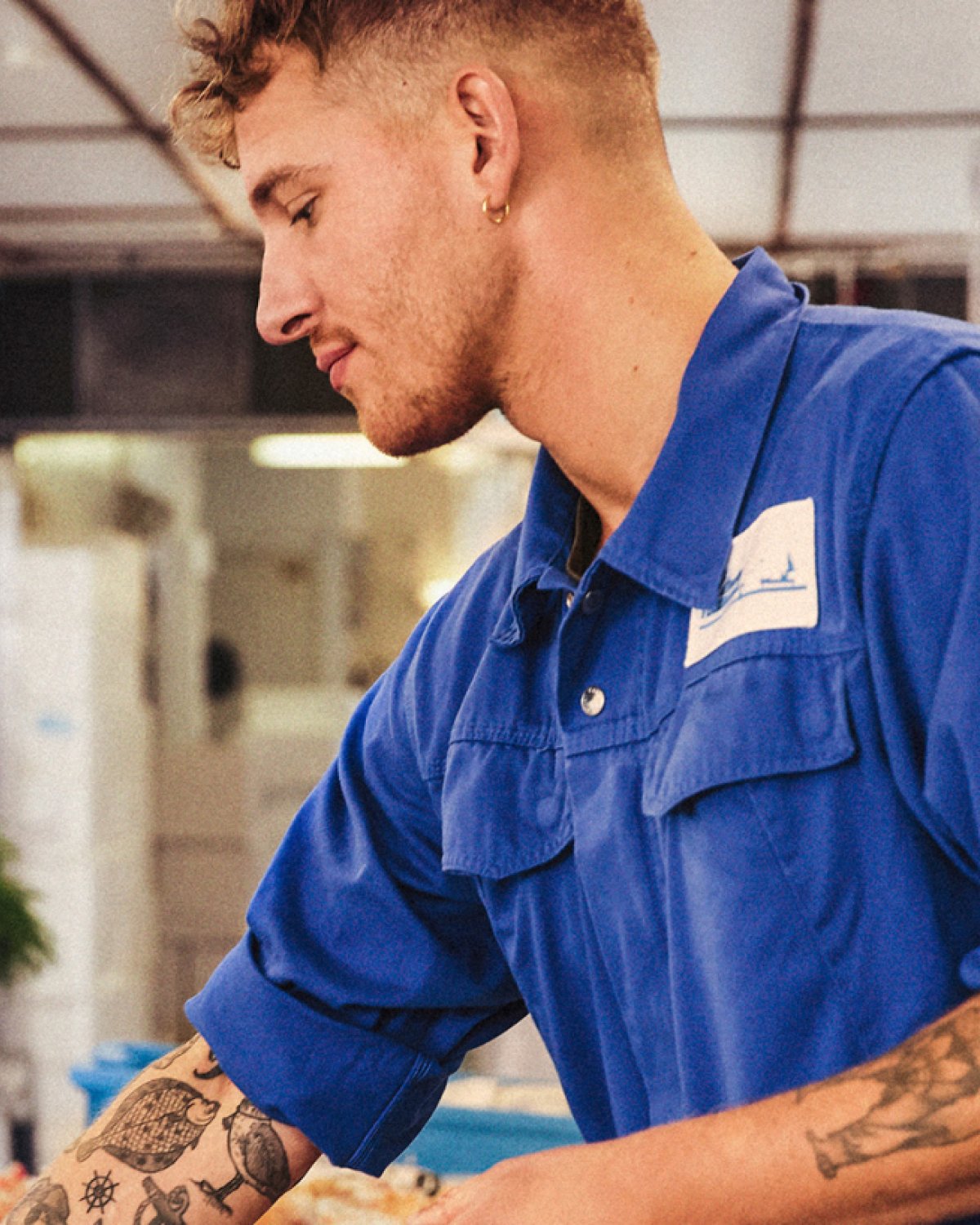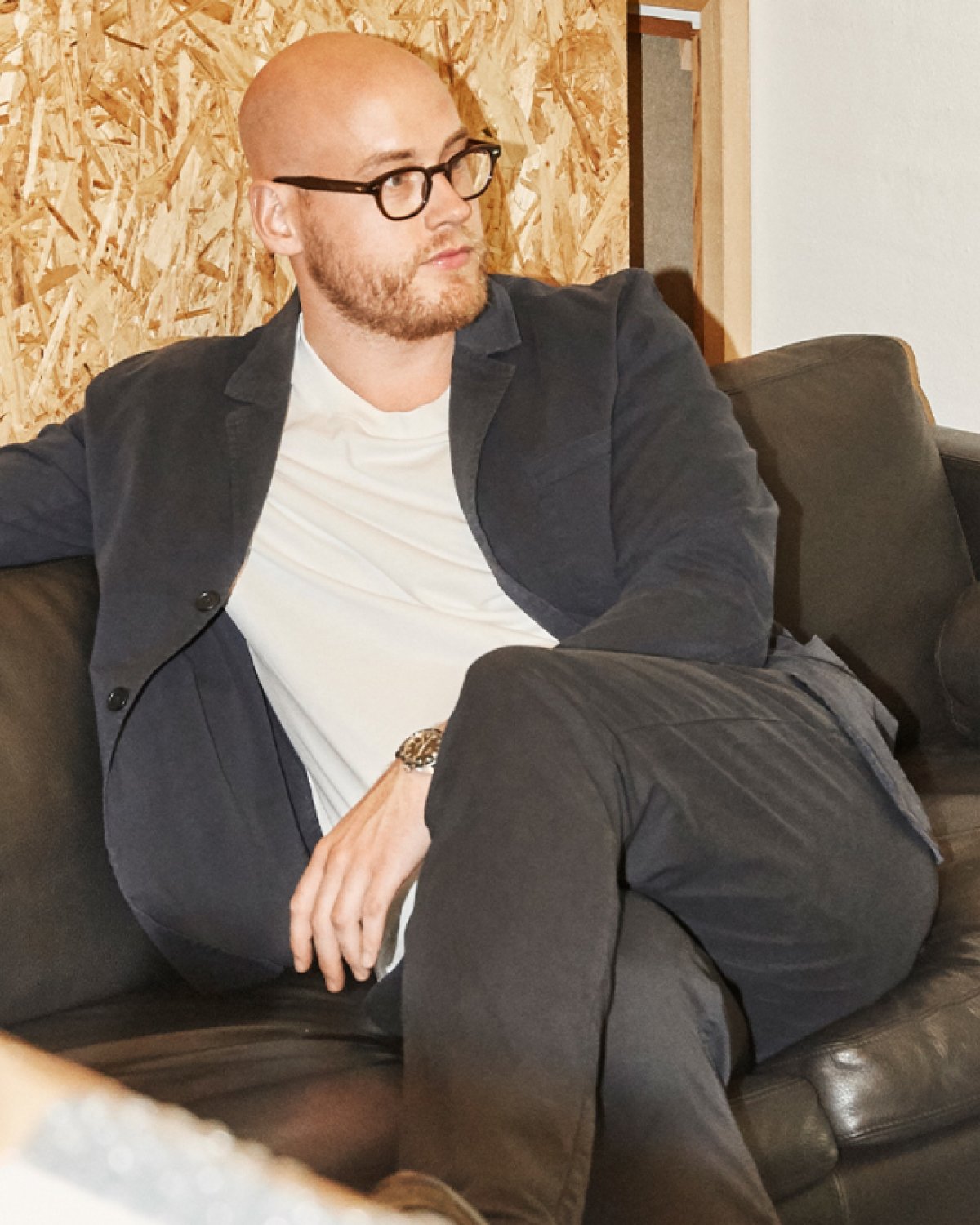For people like myself who spend the majority of my working day in front of a screen, there’s an enviable mythology connected to the fine art of learning a craft and working with your hands. And if you love food and eating like I do, chances are that you would have a hard time finding a better job than Jakob Clausen’s: fishmonger on the harbour of Aarhus.
Not only does he get his hands on the freshest fish imaginable. He prepares it, cuts it, displays it, and sells it with pride to an ever-growing crowd of die-hard loyal customers in his shop. Jakob knows most of them by name.

Spending a few hours in his company reveals that not only is he, by the age of 25, more than ready to carry and develop his family legacy onwards. He has also already learned all the tools of the trade: from demanding the best possible quality produce from his extended eyes at the fish auctions in Jutland to mastering and challenging the jargon you’ll find in quirky places like a harbour. He’s at home here, by the sea. Well, in more than one sense, because this is also where he spends the vast majority of his waking hours.
“Our working day starts at 3am from Monday to Friday when the fish we have bought from the auctions the day before arrives. We also work on Saturdays. At 3am we handle the fish and prepare it for canteens and public institutions. A few hours later, four trucks loaded with freshly cut produce leave our shop to deliver the goods” Jakob explains.
"My office hours begin at 6am. That’s when the auctions on the West Coast of Jutland begin. I’m on the phone with all of them: Hirtshals, Hanstholm, Skagen, Thyborøn, Hvide sande, Thorsminde, and then finally Grenaa. The first call I make is to Karl Erik from Hirtshals. We go through today’s auction together. I need him to make sure he only bids on the freshest fish for me, and pay a reasonable price for it. If there’s loads of cod, the price is low. If there’s a limited amount, he might suggest that i wait another day. After hanging up with Karl Erik, I call birger from hanstholm. And so it continues for a few hours.”

When Jakob’s dad ran the business there were 45 fishmongers and 200 cutters in Aarhus. Today there are four fishmongers and five cutters. Things have changed. Jakob’s father and his father before him built a reputation for the shop in the city so it’s now a well-established mainstay that both locals and tourists know. People visit it, have their favourite fish monger, and expect him – it’s mostly men – to remember their preferences. A constant reminder to always be on their toes.
It takes a lot to run a business that is 130 years old with basically the same products day in day out, and then exist in a modern market with competition, informed customers, or lack thereof, and digital opportunities. Opportunities that Jakob and his team are not necessarily deeply acquainted to – after all, they spend an extremely limited amount of minutes in front of a screen every day – but that they’ve nonetheless cracked the code to. Without any help from agencies or other creatives, but just by using the hyperlocal jargon, a certain amount of cockiness, and what’s at hand in their own shop: fish, fish, fish.
One day we randomly made a video and posted it on Facebook.
“One day we randomly made a video and posted it on Facebook” Jakob explains. “And it took off. People like the straightforward tone of voice we have here on the harbour, and somehow we have managed to successfully condense that into videos that we now publish every week to our Facebook page. There’s no big strategy behind it, it’s just us and loads of humour. Down here, the occasional curse word and constant laughter break down the nervousness of buying and cooking fish.”

“Clausens Fiskehandel” is exceptional in the sense that Jakob insists on free access to the products. Instead of a conventional counter the staff can walk around a huge ice table and get close to the customers on the way. There’s an ongoing fight with the danish food safety authorities about the table, but Jakob is not giving in – it’s worth the fight.
"I want a visit to our shop to be about more than just buying fish. That’s why we also invite our customers in for dinners where we cook and explain about what species they should eat at what time. There’s an educational element to it as well. I want people to eat what’s in season because they get a cheaper and better product. If we eat hake, haddock, pollack, and gurnard, we would never have to discuss sustainability in the oceans again,“ he explains, and i decide on the spot that from now on there’s fish on the menu in my kitchen at least twice a week. Why not? Jakob agrees:
"Last year, Denmark exported 92% of the fish we caught. We are surrounded by coast, but we only consume 8% ourselves. Primarily plaice or cod. We are extremely poor at utilizing what’s just in front of us” he explains.
Jakob smokes cigarettes like a chimney and his arms are covered in tattoos. He is indeed born and bred with the sea and its traditions close by, but there’s more to the story about him. He’s a published author. Five years in the making he had a finished book by the age of 21.
"Writing is a way to gather my thoughts by getting them down on paper. I’d been writing on an old typewriter on and off for five years. One day the pieces came together, and I saw the outline of a plot, so with some help from a friend of my family, I finished the book and it was published” he explains like it’s no big deal. And somewhere deep down, there might still be a journalist dream. For many years Jakob thought that journalism would be his craft, and the dream is not necessarily buried yet. Right now there’s just something else to focus on.

Running the shop takes all his time. And there’s still a lot of work to be done both inside and outside the shop. Not only does he want to sell fish to the locals. He wants to educate them as well, and gets almost furious when talking about misused terms like ‘sustainability’ when it comes to food.
“I don’t really believe in terms like ‘organic’ or ‘sustainable’ when it comes to fish, because it does not make sense to talk about with fresh, naturally sourced produce. The supermarkets can follow along, but it doesn’t make sense for us to do it. An organic fish is a farmed fish, because you know exactly what it’s fed on. But the majority of the delicious catch we buy every day is not allowed to be labeled organic, because it’s been living a free life. I know that the quality of the fish I sell is the very best I can get my hands on, and then people expect it to be organic due to lack of information. It becomes a discussion based on ignorance.”
We’re ready to wrap up when I casually ask him how often he fishes by himself and what his biggest catch is. His answers is surprising, to say the least.
“I’ve never caught a fish.” He laughs and continues. “I know it sounds weird. The only time was when I caught a dead garfish, because I forgot to pull in my fishing rod when sailing from Aarhus to Egaa marina, a 15 minute trip. That’s it. Terrible,” he ends, before lighting another smoke and opening a beer. Even though it’s only noon he’s ready for a break and then a nap, before he wakes up very early tomorrow morning – some might even call it late today – to continue. Another massive truck load of fresh fish is arriving in less than 14 hours. It’s time to rest. Another day, another dollar.
All content comes from the website : https://minimumfashion.com/
